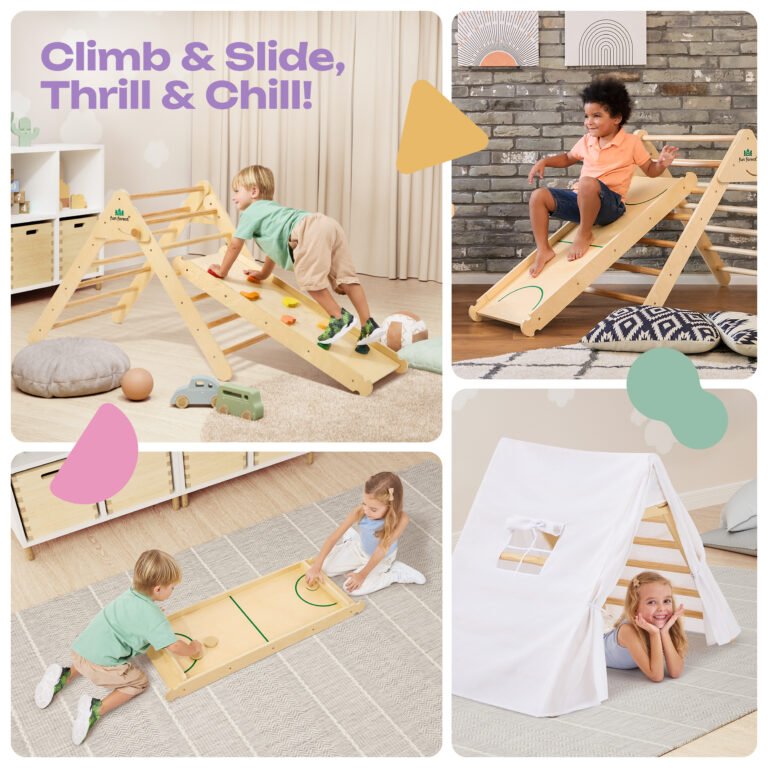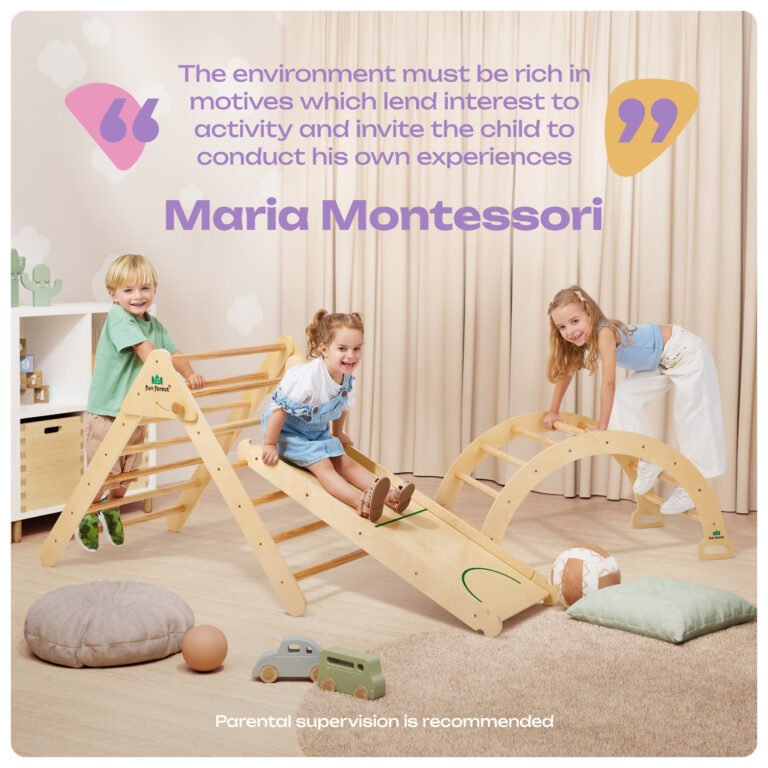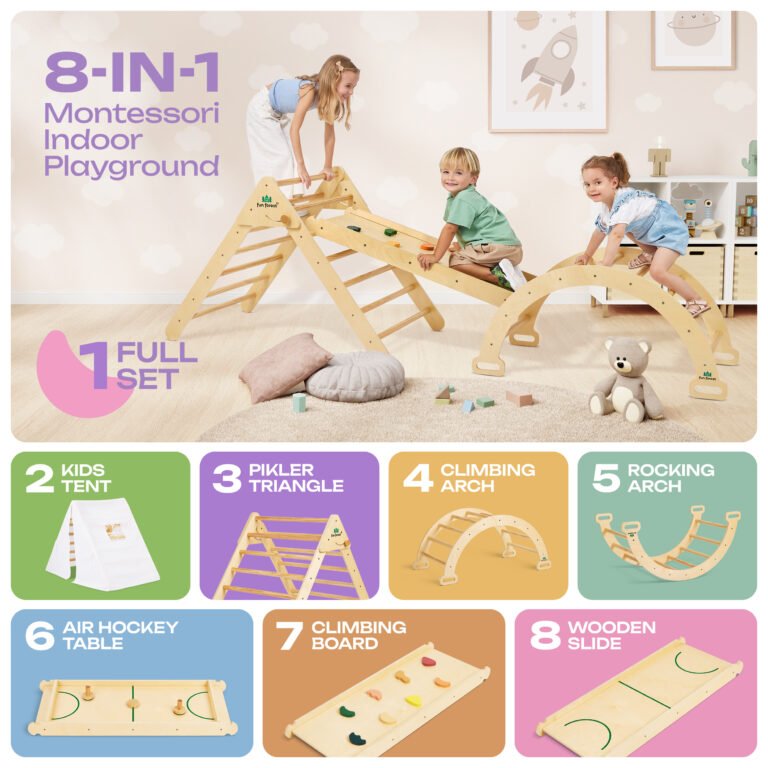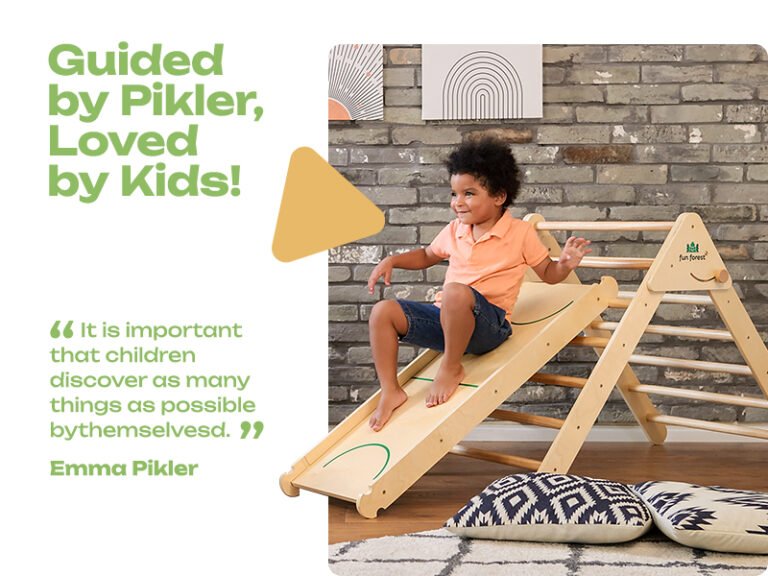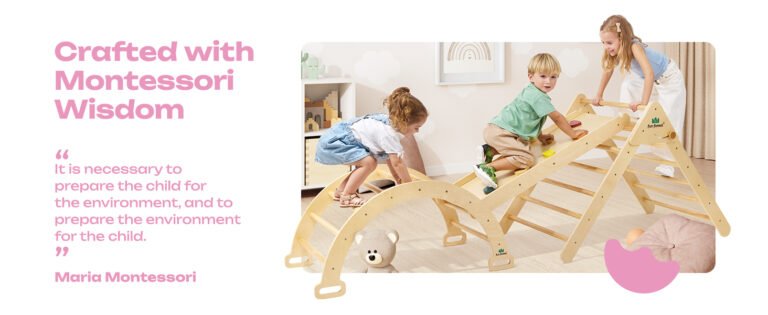Double the Fun: How Pikler Triangles Transform Playdates and Build Beautiful Friendships
Picture this: Two children approach a Pikler triangle together. One child confidently begins climbing while the other watches thoughtfully from below. Without any adult direction, they begin to communicate—”I’m going to the top!” “Wait for me!” “Let’s pretend this is our castle!” What unfolds next is pure magic: cooperative play, shared adventures, and the building blocks of lifelong friendship skills.
While Pikler triangles are incredible tools for individual development, their power truly shines when children play together. These climbing structures become catalysts for social development, teaching cooperation, communication, and empathy in the most natural way possible—through joyful, shared play.
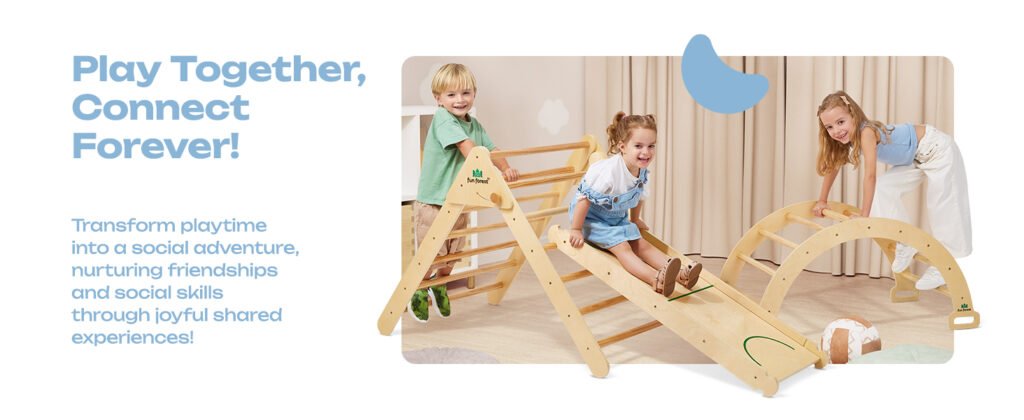
The Magic of Shared Adventure
When two or more children encounter a Pikler triangle together, something beautiful happens. The structure becomes more than climbing equipment—it transforms into a shared world of possibilities where friendships flourish and social skills develop organically.

Natural Social Learning Laboratory
Unlike structured activities or adult-directed games, the Pikler triangle creates an environment where children naturally learn essential social skills:
- Turn-taking: Waiting for space to climb safely
- Communication: Sharing intentions and coordinating movements
- Cooperation: Working together to achieve shared goals
- Empathy: Helping friends who might be struggling or scared
- Leadership: Taking turns being the confident guide
- Following: Learning to support others’ ideas and plans
Age-Based Social Play Patterns
The beauty of Pikler triangle social play is how it adapts to different developmental stages, always providing age-appropriate opportunities for connection and learning.
Toddler Parallel Play (18 months – 2.5 years)
At this stage, children often engage in parallel play—playing near each other while focusing on their own activities:
What You’ll See:
- Side-by-side climbing: Two toddlers using different parts of the triangle simultaneously
- Imitation: One child copying another’s movements or approach
- Awareness building: Beginning to notice and respond to other children’s presence
- Resource sharing: Learning to coexist in the same space peacefully
Social Skills Developing:
- Basic awareness of others
- Gentle introduction to sharing space
- Observation and imitation skills
- Comfort with peers in active play
Preschooler Cooperative Play (2.5 – 4 years)
This is when the real magic of social climbing begins to emerge:
What You’ll See:
- Coordinated climbing: Children planning routes together
- Helper relationships: More confident climbers assisting cautious friends
- Imaginative scenarios: “Let’s pretend we’re mountain climbers!”
- Problem-solving together: Figuring out how to share the space safely
Social Skills Developing:
- Basic cooperation and teamwork
- Communication during physical activity
- Empathy and helping behaviors
- Shared imaginative play
School-Age Social Mastery (4+ years)
Older children use the triangle for increasingly sophisticated social interactions:
What You’ll See:
- Complex games: Creating elaborate rules and scenarios
- Teaching relationships: Older children instructing younger ones
- Competitive elements: Friendly challenges and races
- Social hierarchies: Natural leadership and following patterns
Social Skills Developing:
- Advanced cooperation and negotiation
- Leadership and mentorship abilities
- Conflict resolution skills
- Complex imaginative collaboration
The Social Benefits That Last a Lifetime
Communication Skills Development
The Pikler triangle naturally encourages children to communicate in meaningful ways:
Physical Communication
- Body language: Learning to read and respond to others’ physical cues
- Spatial awareness: Understanding personal space and respecting boundaries
- Non-verbal cooperation: Coordinating movements without words
Verbal Communication
- Safety communication: “I’m coming up!” or “Wait, I need to get down!”
- Play negotiation: “Can we pretend this is a ship?”
- Encouragement: “You can do it!” or “Try this way!”
- Problem-solving dialogue: “How can we both climb at the same time?”
Emotional Intelligence Building
Shared climbing experiences create perfect opportunities for emotional growth:
Empathy Development
- Recognizing fear: Understanding when a friend feels scared or uncertain
- Offering support: Learning to encourage without pressuring
- Celebrating success: Sharing in others’ achievements genuinely
- Managing disappointment: Handling it when friends succeed where they struggle
Emotional Regulation in Social Contexts
- Managing excitement: Learning to be enthusiastic without overwhelming others
- Patience practice: Waiting for turns and respecting others’ pace
- Frustration management: Dealing with crowded equipment or conflicting ideas
- Joy sharing: Experiencing the enhanced happiness that comes from shared fun
Cooperation and Teamwork Skills
The physical nature of Pikler triangle play creates natural opportunities for cooperation:
Shared Goal Achievement
- Fort building: Working together to create imaginative structures
- Safety spotting: Helping ensure each other’s safe navigation
- Creative construction: Using additional props to enhance play together
- Group challenges: Creating and completing collaborative physical tasks
Conflict Resolution
- Space negotiation: Learning to share climbing areas fairly
- Idea integration: Combining different play ideas into shared adventures
- Fair play: Developing internal sense of justice and fairness
- Compromise skills: Finding solutions that work for everyone
Creating the Perfect Social Play Environment
Space Considerations for Multiple Children
When planning for social Pikler triangle play, consider:
Safety Spacing
- Clear perimeter: Adequate space around the triangle for safe movement
- Soft landing areas: Extra padding for areas where multiple children might land
- Visual supervision: Setup that allows easy adult oversight without interference
- Emergency access: Clear paths for adult intervention if needed
Equipment Configuration
- Multiple access points: Ensuring several children can climb simultaneously
- Varied difficulty levels: Options for children of different abilities
- Extended play possibilities: Additional props that enhance social scenarios
The Complete Set Advantage for Social Play
While a single triangle provides wonderful social opportunities, a complete set exponentially increases the possibilities for shared play:
🎯 Complete Fun Forest Pikler Set
The Complete Set transforms social play possibilities:
🏰 Multiple play zones: Different children can engage in various activities simultaneously
🧗 Progressive challenges: Children of different abilities can find appropriate challenges
🎭 Enhanced imagination: More components mean richer imaginative scenarios
🤝 Reduced conflict: More options mean less competition for the same space
🎪 Extended engagement: Variety keeps groups engaged longer
🏆 Leadership opportunities: Complex setups allow children to teach and guide others
Single Triangle Social Magic
Even with just one triangle, social play thrives:
🌲 Fun Forest Pikler Triangle
A single, well-designed triangle creates abundant social opportunities:
✨ Shared climbing experiences: Taking turns and climbing together
🎯 Imaginative play catalyst: Becomes anything children dream up together
🤲 Natural cooperation: Limited space requires sharing and communication
🏅 Confidence building: Children support each other’s achievements
🔄 Turn-taking practice: Built-in opportunities for patience and fairness
Facilitating Positive Social Experiences
The Adult’s Role in Social Triangle Play
Parents and caregivers play a crucial but subtle role in maximizing social benefits:
What TO Do:
✅ Observe quietly: Watch for natural social dynamics without immediate intervention
✅ Ensure safety: Maintain awareness of physical safety without micromanaging
✅ Encourage effort: Celebrate attempts and cooperation, not just achievements
✅ Model respect: Demonstrate how to treat others and their ideas with respect
✅ Provide props: Offer additional materials that enhance cooperative play
What NOT to Do:
❌ Direct the play: Avoid telling children how to play together
❌ Solve every conflict: Allow children to work through minor disagreements
❌ Compare children: Resist highlighting differences in ability or confidence
❌ Rush interactions: Let relationships and play patterns develop naturally
❌ Create artificial rules: Trust children to develop fair play organically
Encouraging Inclusive Play
Help ensure all children feel welcome and included:
Supporting Shy Children
- Gentle encouragement: Offer support without pressure
- Buddy system: Pair cautious children with patient, encouraging friends
- Alternative roles: Help them find ways to participate that feel comfortable
- Celebrate small steps: Acknowledge any attempts at social engagement
Guiding Confident Children
- Channel leadership positively: Encourage helping rather than dominating
- Teach patience: Help them understand others may need more time
- Model inclusion: Show how to invite and include rather than exclude
- Balance confidence: Encourage humility alongside achievement
Real-World Social Scenarios
The First Playdate
When children first encounter a Pikler triangle together:
Typical progression:
- Observation phase: Children watch each other cautiously
- Parallel exploration: Playing near but not directly with each other
- First interactions: Simple communications about intentions
- Cooperative moments: Brief instances of shared play
- Friendship building: Repeated positive interactions build connection
Mixed Age Groups
When children of different ages play together:
Natural mentorship emerges:
- Older children naturally become teachers and helpers
- Younger children gain confidence from peer support
- Both groups benefit from the relationship dynamic
- Social skills develop across age differences
Regular Playgroup Dynamics
Children who regularly play together on Pikler triangles often develop:
Sophisticated cooperation patterns:
- Complex imaginative scenarios that continue across play sessions
- Established roles and leadership patterns
- Advanced problem-solving and conflict resolution skills
- Deep friendships based on shared physical adventures
The Long-Term Social Benefits
School Readiness
Children who experience rich social play on Pikler triangles often show:
- Better classroom cooperation: Understanding of sharing and turn-taking
- Enhanced communication: Ability to express needs and negotiate with peers
- Conflict resolution skills: Experience working through disagreements
- Leadership abilities: Confidence in guiding and helping others
- Inclusion mindset: Natural tendency to welcome and include others
Sports and Team Activities
The cooperative skills developed through triangle play transfer beautifully to:
- Team sports: Understanding of working toward shared goals
- Group projects: Ability to coordinate efforts with others
- Leadership roles: Confidence in guiding group activities
- Supportive relationships: Natural tendency to encourage teammates
Lifelong Friendship Skills
Perhaps most importantly, children learn fundamental relationship skills:
- Empathy and compassion: Understanding and responding to others’ needs
- Communication: Expressing ideas and listening to others
- Cooperation: Working together toward common goals
- Loyalty: Standing by friends through challenges
- Joy sharing: Enhancing happiness through shared experiences
Creating Your Social Play Haven
Whether you’re planning regular playdates or simply want to be ready when friends visit, a Pikler triangle creates the perfect foundation for social development and friendship building.
For Growing Social Circles
🌟 Start with the Fun Forest Pikler Triangle if you’re beginning to host playdates and want to create positive social experiences. This beautiful, sturdy triangle provides the perfect foundation for friendship building and social skill development.
For Active Social Families
🎯 Choose the Complete Fun Forest Set if your home is a regular gathering place for children. The expanded options ensure every child finds their comfort zone while creating countless opportunities for cooperative play and friendship building.
Building Friendships, One Climb at a Time
In our increasingly digital world, opportunities for genuine, physical, cooperative play are more precious than ever. A Pikler triangle provides exactly that—a space where children can build real relationships through shared adventure, mutual support, and joyful collaboration.
Every time children play together on a Pikler triangle, they’re not just developing physical skills—they’re learning the fundamental lessons of friendship: how to share, how to encourage, how to communicate, and how to care for others. These lessons, learned through laughter and adventure, become the foundation for all future relationships.
Ready to transform playdates and build beautiful friendships in your home?
The climbing structure becomes the friendship catalyst. The shared adventures become treasured memories. The social skills developed become lifelong gifts.
Choose your Fun Forest Pikler triangle today, and watch as your home becomes the place where friendships flourish and social skills soar.
Because the best friendships are built on shared adventures, mutual support, and the kind of joy that only comes from climbing to new heights together.


